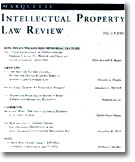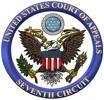New Issue of Marquette Intellectual Property Law Review Is Here
 Thanks to the outstanding work of its editors and staff members, the Winter 2009 issue of the Marquette Intellectual Property Law Review has just been released to the public! The issue opens with an article from Professor Jerome H. Reichman, the Bunyan S. Womble Professor of Law at Duke Law School, on “Rethinking the Role of Clinical Trial Data in International Intellectual Property: The Case for a Public Goods Approach.” An early version of this article was presented by Professor Reichman as the 11th Honorable Helen Wilson Nies Momorial lecture at Marquette Law School in March of 2008. The publication also features two additional articles, one from St. Mary’s University School of Law Professor Robert H. Hu on “International Legal Protection of Trademarks in China,” and one from Dr. Thomas M. Mackey on “Nanobiotechnology, Synthetic Biology, and RNAI: Patent Portfolios for Maximal Near-Term Commercialization and Commons for Maximal Long-Term Medical Gain.” Last, but not least, two excellent comments from our own students conclude the issue: Tiffany N. Beaty on “Navigating the Safe Harbor Rule: The Need for a DMCA Compass,” and Jeremiah A. Bryaron on “What Goes Around, Comes Around: How Indian Tribes Can Profit in the Aftermath of Seminole Tribe and Florida Prepaid.”
Thanks to the outstanding work of its editors and staff members, the Winter 2009 issue of the Marquette Intellectual Property Law Review has just been released to the public! The issue opens with an article from Professor Jerome H. Reichman, the Bunyan S. Womble Professor of Law at Duke Law School, on “Rethinking the Role of Clinical Trial Data in International Intellectual Property: The Case for a Public Goods Approach.” An early version of this article was presented by Professor Reichman as the 11th Honorable Helen Wilson Nies Momorial lecture at Marquette Law School in March of 2008. The publication also features two additional articles, one from St. Mary’s University School of Law Professor Robert H. Hu on “International Legal Protection of Trademarks in China,” and one from Dr. Thomas M. Mackey on “Nanobiotechnology, Synthetic Biology, and RNAI: Patent Portfolios for Maximal Near-Term Commercialization and Commons for Maximal Long-Term Medical Gain.” Last, but not least, two excellent comments from our own students conclude the issue: Tiffany N. Beaty on “Navigating the Safe Harbor Rule: The Need for a DMCA Compass,” and Jeremiah A. Bryaron on “What Goes Around, Comes Around: How Indian Tribes Can Profit in the Aftermath of Seminole Tribe and Florida Prepaid.”
To all students and authors who put so much work into making this endeavor a success, congratulations again on an excellent Issue of the Marquette Intellectual Property Law Review! And to all others . . . enjoy the readings; they are truly interesting and greatly contribute to the academic and professional dialogue well beyond the intellectual property community!

